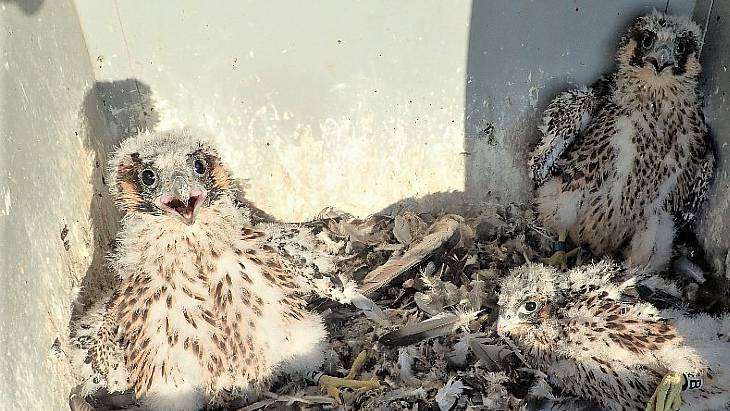The programme to encourage the birds to nest around cooling towers has been running for more than a decade and now, of the country’s estimated 130 pairs of falcons, 10 nest on buildings owned by ČEZ.
"It's great, this year there are 10 successfully nesting pairs in ČEZ locations, which have given birth to an incredible 33 young - four sets of quadruplets, five triplets and one set of twins. More importantly, all the chicks were ringed this year, so I hope we will hear more about them in the years to come," ornithologist Václav Beran said.

The chicks are all tagged are part of the conservation efforts (Image: ČEZ)
ČEZ Group has growing experience in the protection of the falcons in industrial locations by placing aluminum falcon perches on high-rise power plant or heating plant buildings. It was in 2011 when the first booth was placed on the walkway of the cooling tower in Elektrárna Tušimice. Since then they have been placed in many more locations - the Dukovany nculear plant got its first breeding pair and chicks in 2020.
Ornithologists from Alka Wildlife have been able to oversee the success of the project, with the company directing the production and installation of booths and also postponing maintenance of the chimney or other activities, such as, for example, climbing exercises for firefighters, during the nesting period.

The top of cooling towers provides privacy, as well as great views (Image: ČEZ)
"The only thing that falcon couples ask of us during nesting and then their juniors is peace. Mainly so that they can move safely on the walkways and later learn to fly and hunt with their parents," said Jan Kalina, director of the renewable and classic energy division for ČEZ.
Peregrine falcons are the world's fastest diving bird, according to Guinness World Records, with one clocking up a diving speed of 242 mph (389 km/h). Their numbers dropped in the middle of 20th Century in many countries, thought to be linked to the use of DDT as a pesticide on crops, but their numbers have been increasing since the end of DDT use, and with increased conservation measures.
According to Alka Wildlife, peregrine falcons have seen a gradual growth in their number in recent years after previously being critically endangered in the Czech Republic. They say that part of the reason for the recovery has been the work with companies such as ČEZ to create the alternatives to natural nesting sites by installing nest boxes on power plant high chimneys as "normally, falcons will nest in rocky sites at altitudes above 100m".





_53504.jpg)

_13505.jpg)
_87975.jpg)






